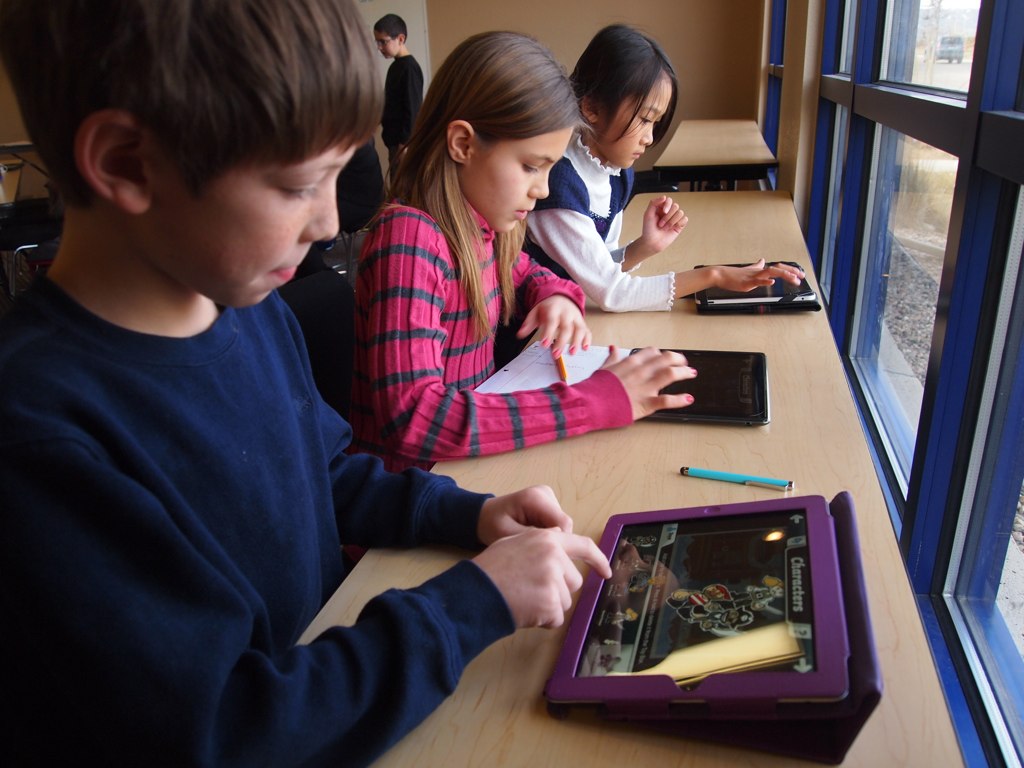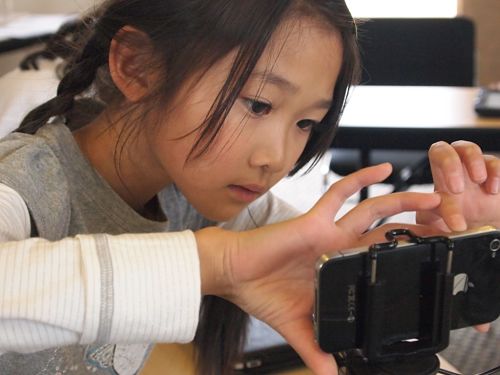31 Game-Based Learning Resources for Educators
https://www.legendsoflearning.com/resource/31-game-based-learning-resources-for-educators/
Game based learning (GBL) offers proven benefits for student engagement and academic performance. But convincing some educators to include GBL in their curriculum can sometimes feel like a clash of the titans—the teen kind, not the ones who dared to defy the Olympian gods.
You, though, are no ordinary teacher. You’re a mighty legend on a mission to help kids and their futures. You come to budget and planning meetings equipped with resources, expert opinions, and data, perhaps some of the information found here. These GBL resources range from books to websites, and from scholarly articles to research studies.
Books
 http://www.schooltechnology.org student_ipad_school - 124
http://www.schooltechnology.org student_ipad_school - 124
The books listed here are available for purchase on Amazon. They won’t be light reading, but that’s what the holidays are for. You can dig into one of them while friends and family brave holiday shopping or some other errand.
- Computer Games for Learning: An Evidence-Based Approach. If you desire to dazzle at the next superintendent meeting, bring MIT’s research with you. The book provides proof in three, primary avenues: the value-added approach, the cognitive-consequences approach, and the media comparative approach. (Author: Richard E. Mayer)
- Quest to Learn: Developing the School for Digital Kids. This book covers the formation, framework, and subsequent success of Quest to Learn, a New York City school that embraced GBL and studied its effects. You can get this book at no cost on Kindle. (Authors: Katie Salen Tekinbas, Robert Torres, Arana Shapiro, et al.)
- Leading Thinkers: Digital Media & Learning. Affirm your GBL cause with the leading thinkers of today. This book, also free on Kindle, asks a simple question of educational thought leaders: how have students’ learning norms changed due to digital media? (Author: MacArthur Foundation)
- The Gamification of Learning and Instruction: Game-Based Methods and Strategies for Training and Education. This book argues that gamification utterly transforms learning design, rather than being a tacked-on component. It makes the case through practical advice and real-world examples. (Author: Karl M. Kapp)
- Gamify Your Classroom: A Field Guide to Game-Based Learning. If you buy only one book from the list, make it this one. The book features practical tips and interviews with a slew of leading experts, including James Paul Gee, Richard Bartle, and Katie Salen. (Author: Matthew Farber)
- The Multiplayer Classroom: Designing Coursework as a Game. This book discusses how to use gaming terminology and concepts to further engage students in classroom subjects. (Author: Lee Sheldon)
- A Playful Path. To cleanse the palate of data-driven books, finish with this one. It emphasizes the importance of play and helps readers find a way back to delight and laughter. (Author: Bernard DeKoven)
Articles and Research
 http://www.schooltechnology.org student_ipad_school - 112
http://www.schooltechnology.org student_ipad_school - 112
Research in the area of GBL goes back at least a decade, but most of the articles and studies found here arise from the past four years.
- Game Based Learning: What It Is, Why It Works, and Where It’s Going. If you’re beginning the journey into GBL techniques and pedagogy, start with New Media Institute’s primer. It offers a great overview of the subject. (Author: New Media Institute)
- Bartle’s Player Type Theory. Bartle’s theory has lost favor in recent years, but it’s a good starting point when thinking about students and their predisposition toward certain learning models. (Author: Richard Bartle)
- Mapping Learning and Game Mechanics for Serious Games Analysis. This article contains information for designers and analysts of games, as well as guidelines teachers can use to evaluate game effectiveness and best practices for implementation. (Authors: Sylvester Arnab, et al)
- Acceptance of Game-Based Learning by Secondary School Teachers. You may think GBL is great, but others don’t. This study helps you understand their perspective and more importantly, gain their acceptance and support. (Authors: Jeroen Bourgonjon, et al)
- Promoting Science Learning in Game-Based Learning with Question Prompts and Feedback. This study helps educators evaluate games for the classroom. The article suggests that science-learning outcomes improve with specific types of prompts, namely, knowledge over application. (Authors: Victor Law and Ching-Huei Chen)
- A Collaborative Game-Based Learning Approach to Improving Students’ Learning Performance in Science Courses. Students gain so much more than increased retention with GBL. They also learn to organize their knowledge, share it with others, and grow more independent and motivated to learn. (Authors: Han-Yu Sung and Gwo-Jen Hwang)
- Enhancing 5th Graders’ Science Content Knowledge and Self-Efficacy through Game-Based Learning. Another science-related article, this one takes a deep dive into the world of fifth graders and the impact of GBL on their retention and critical-thinking abilities. (Author: Angela Meluso, et al)
- Learning through Playing Virtual Age. Teachers in the sciences wanting an in-depth review of the game Virtual Age may enjoy this article, as might teachers exploring methods to increase student engagement and knowledge retention. (Authors: Meng-Tzu Cheng, Y-Wen Lin, and Hsiao-Ching She)
- Assessing Foreign Language Learning through Mobile Game-Based Learning Environments. Teachers in language arts or with older students should consider this study. It explores the effects of a collaborative foreign language learning app on student outcomes. (Authors: Manuel Palomo Duarte, et al)
- Playing to Learn: Panelists at Stanford. This article is a must-read with its sound bytes. Read and use them when reconvening with the people who set the annual EdTech budget. (Author: Stanford University)
Websites
 http://www.schooltechnology.org Photos of elementary students using iPads at school to do amazing projects. student_ipad_school - 030
http://www.schooltechnology.org Photos of elementary students using iPads at school to do amazing projects. student_ipad_school - 030
Numerous organizations study teaching pedagogies, with some emphasizing digital literacy and GBL initiatives. A selection of the best ones follows below.
- National Education Institution
- Association for Supervision and Curriculum Development (ASCD)
- The Joan Ganz Cooney Center (at Sesame Workshop)
- Institute of Play
- Games + Learning + Society Center
- Games and Learning
- Mind/Shift (from KQED, PBS)
- Edutopia
- Education Week
- TeachThought
- EdSurge
- EdTech
- The Journal, Transforming Education through Technology
- Edudemic, Connecting Education & Technology
We could go on, but time is a precious resource when you’re a legend with teaching ability. Plus, the resources found here should take you well into 2017 and beyond. If we missed a source, give us a shout. We become Legends of Learning by working as a league.
Images: Brad Flickinger (Creative Commons)
31 Game-Based Learning Resources for Educators的更多相关文章
- (转) Deep Learning Resources
转自:http://www.jeremydjacksonphd.com/category/deep-learning/ Deep Learning Resources Posted on May 13 ...
- Pros and Cons of Game Based Learning
https://www.gamedesigning.org/learn/game-based-learning/ I remember days gone by at elementary schoo ...
- Applied Deep Learning Resources
Applied Deep Learning Resources A collection of research articles, blog posts, slides and code snipp ...
- 强化学习之 免模型学习(model-free based learning)
强化学习之 免模型学习(model-free based learning) ------ 蒙特卡罗强化学习 与 时序查分学习 ------ 部分节选自周志华老师的教材<机器学习> 由于现 ...
- WatchKit Learning Resources
查看原文:http://leancodingnow.com/watch-kit-learning-resources/ WatchKit是Apple发布的用来开发Apple Watch应用的框架,本 ...
- 【RS】Automatic recommendation technology for learning resources with convolutional neural network - 基于卷积神经网络的学习资源自动推荐技术
[论文标题]Automatic recommendation technology for learning resources with convolutional neural network ( ...
- Game Based Learning: Why Does it Work?
Forty years of research[i] says yes, games are effective learning tools. People learn from games, an ...
- chip based learning
chip types Transistor mode of operation Digital chip: 0/1 -> digital clac Analog chip: sound / b ...
- Embedded based learning
简单整理了一些嵌入式底层需要接触的相关概念. # CPU CU. Control Unit. send need-clac-data -> ALU clac -> get resul ...
随机推荐
- Svn CleanUp failed解决方案
在项目目录下找到wc.db文件,使用sqlite工具打开,清空main下的WC_LOCK和 WORK_QUEUE表即可.
- SQL系列(八)—— 分组(group by)
在很多场景时,需要对数据按照某条件进行分组统计其数量.平均值等等.有这种需求,SQL自然也有解决方式. 在SQL中通过group by子句对结果按某条件进行分组.语法: select count(co ...
- SQL Server 事务日志截断、回绕与收缩(转载)
每个 SQL Server 数据库都具有事务日志,用于记录所有事务以及每个事务对数据库所做的修改. 必须定期截断事务日志以避免它被填满. 但是,一些因素可能延迟日志截断,因此监视日志大小很重要. 某些 ...
- Oracle 加解密教程
参考Oracle官方文档 在Oracle使用dbms_crypto包进行加解密 首先,授权当前用户使用加解密包 在sql中运行:connect sqlplus as sysdbagrant execu ...
- framework7 下拉刷新、无限滚动
下拉刷新: html: <div class="page-content ptr-content"> <%--下拉刷新图标--%> <div clas ...
- Golang 是否有必要内存对齐?
原文:https://ms2008.github.io/2019/08/01/golang-memory-alignment/ 内存模型 Posted by ms2008 on August 1, 2 ...
- asp.net 报错 SAP 报错 试图加载格式不正确的程序。 (异常来自 HRESULT:0x8007000B)
“/”应用程序中的服务器错误. 试图加载格式不正确的程序. (异常来自 HRESULT:0x8007000B) 说明: 执行当前 Web 请求期间,出现未经处理的异常.请检查堆栈跟踪信息,以了解有关该 ...
- 【转】 python_控制台输出带颜色的文字方法
在python开发的过程中,经常会遇到需要打印各种信息.海量的信息堆砌在控制台中,就会导致信息都混在一起,降低了重要信息的可读性.这时候,如果能给重要的信息加上字体颜色,那么就会更加方便用户阅读了. ...
- CSS之盒子居中的方法
一.盒子垂直居中的方法 1.先让盒子的上下边缘和父盒子的水平中心线重叠,,然后再让子盒子往回移动自身一半的距离 <div class="father"> // 结构 & ...
- FreeRTOS 任务通知模拟二值信号量
FreeRTOS官方统计,使用任务通知替代二值信号量的时候,任务解除阻塞的时间要快45%,并且需要的RAM也更少 举例 void DataProcess_task(void *pvParameters ...
